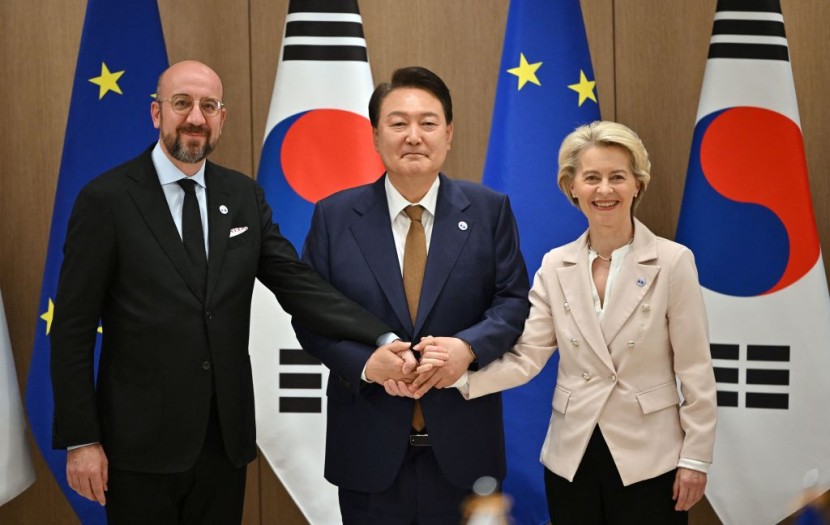
On Monday, South Korean and EU leaders agreed to boost pressure on Russia over its war in Ukraine and criticize North Korea's ballistic missile testing.
During the weekend G7 summit in Hiroshima, Japan, South Korean President Yoon Suk Yeol met with European Council President Charles Michel and European Commission President Ursula von der Leyen in Seoul.
South Korea, EU Condemns North Korean Missile Tests
Michel said Russia's ongoing actions on Ukraine prove that EU-South Korea collaboration is needed "not luxury. It's essential."
The three presidents urged North Korea to end military tensions and resume nuclear disarmament discussions. Yoon said the three leaders acknowledged the global threat of North Korea's nuclear and missile programs, ABC News reported.
Since 2022, North Korea has fired around 100 missiles, many of them nuclear-capable. Analysts say North Korea thinks its enlarged arsenal will help it get concessions from its adversaries.
Japan, the US, the UK, France, Germany, Canada, Italy, and the EU criticized Russia's incursion and reaffirmed their support for Ukraine during the G7 conference. They demanded North Korea stop destabilizing and escalating.
After the G7 meeting ended on Sunday, Ukrainian President Volodymyr Zelensky met with some of his strongest supporters, boosting his country's war effort despite Russia's military triumph, which Ukraine denied. When Zelensky arrived Saturday, the G7 nations had announced further sanctions and other steps to punish Moscow for its February 2018 invasion.
EU wants more investment, collaborative research, and cooperation in industries like semiconductors, electric batteries, and AI, where South Korea and other multinational enterprises are ahead of Europe. Both sides are dedicated to the World Trade Organization, unlike China and the US, and they will want to debate ways to strengthen trade multilateralism.
South Korea, the ninth-largest arms exporter, has provided humanitarian aid to Ukraine and sent tanks and howitzers to Poland, Kyiv's primary partner in the war against Russia. Last month, the president's administration said Seoul's military help to Kyiv hinged on Moscow. As per Daily Sun, it claimed a major civilian attack might shift the balance.
Read Also : 1.5 Million Migrants Urge To Apply for US Sponsorship as Dems Beg Biden To Expedite Migrant Work Permits
EU, Seoul Express Support for Ukraine
Leaders pledged to support Ukraine and raised pressure on Russia. After meeting with Zelensky's wife, Olena Zelenska, in Seoul last week, Yoon met with him on the margins of the G7 in Japan on Sunday. According to South Korea's presidential office, Yoon pledged demining equipment and ambulances to Ukraine at Zelensky's request during his meeting in Hiroshima.
Seoul, a major producer of artillery shells, has not sent lethal weapons to Ukraine because of its ties with Russia, but Yoon hinted at a change of heart in a Reuters interview last month.
At the news conference, Von der Leyen praised Yoon for South Korea's financial and humanitarian contributions to Ukraine.
Yoon and the EU leaders also urged for freedom of airspace and navigation in the South China Sea and peace and stability across the Taiwan Strait, opposing unilateral Indo-Pacific status quo changes. South Korea and the EU will cooperate on economic security, including early warning systems for semiconductor chip supply chain disruptions. South Korea hosts 28,000 US soldiers.
South Korea's biggest commercial partner, China, is also its economic partner. Yoon must balance those two ties while fending against North Korea, which is building nuclear weapons and missiles. The statement warned that climate change, biodiversity loss, and pollution constitute an "existential threat" and that "green cooperation" with the EU will promote an ecologically responsible transition.
Both parties also agreed to increase health cooperation, identifying and addressing health hazards and helping other nations do the same.
© 2026 HNGN, All rights reserved. Do not reproduce without permission.








